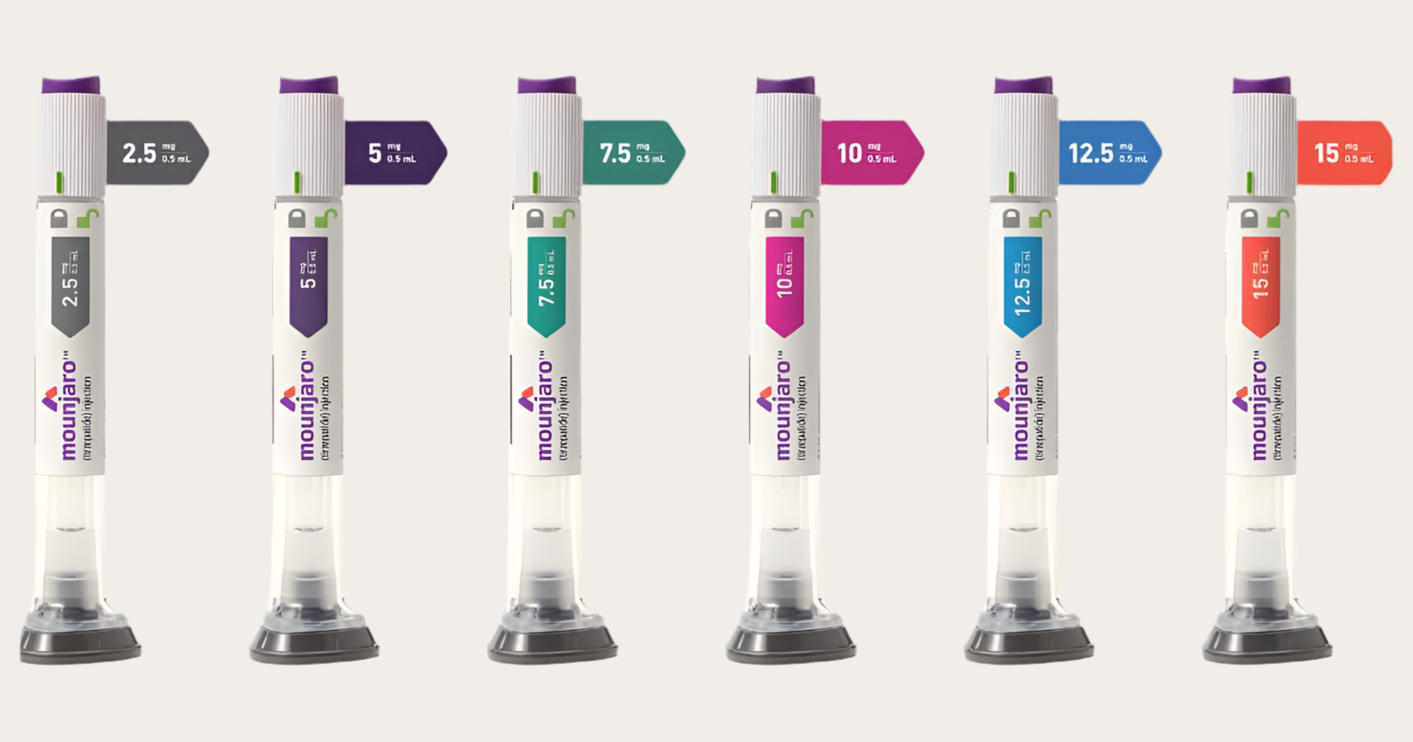Mounjaro - Eli Lilly®
Mounjaro - Eli Lilly®
Pharma-grade testosterone for optimized hormone levels, muscle mass retention, and peak vitality — 300mg/mL.
Impossible de charger la disponibilité du service de retrait
Ships in 24 Hours — Discreet. Secure. Trackable.
Share
Tags: #Immortal Medicals
SKU: SKU:
Express delivery available
Free Reship Guaranteed
- Product Overview
- Shipping Information
- How to pay
- Purity
- Third-Party Tested
- Science-Backed
Mounjaro - Eli Lilly®
4-week cycle
Important Safety Information for Mounjaro®
Do not share your Mounjaro® pen with other people, even if the needle has been changed. You may give other people a serious infection, or get a serious infection from them.
What is the most important information I should know about Mounjaro®?
Mounjaro® may cause serious side effects, including:
- Possible thyroid tumors, including cancer. Tell your health care provider if you notice a lump or swelling in your neck, hoarseness, trouble swallowing, or shortness of breath. These may be symptoms of thyroid cancer. In studies with rats, medicines like Mounjaro® caused thyroid tumors, including a type of thyroid cancer called medullary thyroid carcinoma (MTC). It is not known if Mounjaro® will cause thyroid tumors or MTC in people.
- Do not use Mounjaro® if you or any of your family have ever had MTC, or if you have an endocrine system condition called Multiple Endocrine Neoplasia syndrome type 2 (MEN 2).
What is Mounjaro®?
Mounjaro® (tirzepatide) injection, available in multiple dose strengths (2.5 mg to 15 mg), is a once-weekly injectable prescription medicine used:
- along with diet and exercise to improve blood sugar (glucose) in adults with type 2 diabetes mellitus.
- to help with weight loss and long-term weight management in adults with obesity (BMI ≥30), or overweight (BMI ≥27) with at least one weight-related condition such as high blood pressure, high cholesterol, or type 2 diabetes.
Mounjaro® is not for use in people with type 1 diabetes.
It is not known if Mounjaro® can be used in people who have had pancreatitis.
It is also not known if Mounjaro® is safe and effective for use in children under 18 years of age.
Important Safety Information
Do not use Mounjaro® if:
- you or any of your family have ever had MTC or if you have MEN 2.
- you are allergic to tirzepatide or any of the ingredients in Mounjaro®. See symptoms of a serious allergic reaction in “What are the possible side effects of Mounjaro®?”
Before using Mounjaro®, tell your health care provider if you:
- have or have had problems with your pancreas or kidneys.
- have a history of diabetic retinopathy.
- are pregnant, plan to become pregnant, or are breastfeeding. It is not known if Mounjaro® will harm your unborn baby or if it passes into your breast milk. You should stop using Mounjaro® at least 1 month before you plan to become pregnant.
Tell your healthcare provider about all medicines you take, including prescription and over-the-counter medicines, vitamins, herbal supplements, and other medicines to treat diabetes, including insulin or sulfonylureas.
What are the possible side effects of Mounjaro®?
Mounjaro® may cause serious side effects, including:
- Inflammation of your pancreas (pancreatitis). Stop using Mounjaro® and call your healthcare provider right away if you have severe stomach pain that doesn’t go away, with or without vomiting.
- Low blood sugar (hypoglycemia). Your risk of low blood sugar may be higher if you use Mounjaro® with another diabetes medicine such as insulin or a sulfonylurea. Symptoms may include dizziness, blurred vision, anxiety, mood changes, sweating, shakiness, confusion, or fast heartbeat.
- Kidney problems (kidney failure). Nausea, vomiting, and diarrhea from Mounjaro® may lead to dehydration, which can worsen kidney problems.
- Severe allergic reactions. Stop using Mounjaro® and seek medical help immediately if you experience swelling of the face, lips, tongue, or throat; difficulty breathing or swallowing; a severe rash; or a rapid heartbeat.
- Gallbladder problems. Tell your healthcare provider right away if you experience upper abdominal pain, fever, yellowing of the skin or eyes (jaundice), or pale stools.
- Changes in vision. Contact your healthcare provider if you notice any vision changes while taking Mounjaro®.
The most common side effects of Mounjaro® include nausea, diarrhea, decreased appetite, vomiting, constipation, indigestion, and stomach pain.
Testosterone Enanthate (300mg/mL) is a powerful injectable compound designed for optimal hormone replacement therapy and performance enhancement. Known for its long ester and consistent absorption rate, it’s ideal for both first-time users and experienced protocols alike.
Testosterone Enanthate (300mg/mL) is a powerful injectable compound designed for optimal hormone replacement therapy and performance enhancement. Known for its long ester and consistent absorption rate, it’s ideal for both first-time users and experienced protocols alike.
Testosterone Enanthate (300mg/mL) is a powerful injectable compound designed for optimal hormone replacement therapy and performance enhancement. Known for its long ester and consistent absorption rate, it’s ideal for both first-time users and experienced protocols alike.
Testosterone Enanthate (300mg/mL) is a powerful injectable compound designed for optimal hormone replacement therapy and performance enhancement. Known for its long ester and consistent absorption rate, it’s ideal for both first-time users and experienced protocols alike.
Testosterone Enanthate (300mg/mL) is a powerful injectable compound designed for optimal hormone replacement therapy and performance enhancement. Known for its long ester and consistent absorption rate, it’s ideal for both first-time users and experienced protocols alike.

How to Start Your Immortal Protocol
-

Choose Your Compounds
Browse from high-potency injectables, capsules, and research-backed stacks designed for peak output.
-

Secure, Discreet Shipping
Every order ships fast in tamper-proof packaging with full tracking no guesswork, no labels that raise questions.
-

Auto Refill Available
Never miss a dose. Maintain optimal blood levels with optional refill scheduling and reorder alerts.
-

GMP Certified
Our supplements are manufactured in facilities that follow Good Manufacturing Practices, ensuring purity, consistency, and excellence
-

Pharmacy-Grade Formulation
Every order ships fast in tamper-proof packaging with full tracking — no guesswork, no labels that raise questions.
-

ISO Certified
Each ingredient is selected with care and precision, meeting professional standards trusted by healthcare providers.
-

Lab-Tested
Scientifically formulated and rigorously tested for efficacy and safety, so you can feel confident in every dose.
OUR HAPPY CUSTOMERS
-

David M, Los Angeles, CA

-

Ana K, Austin, TX

-

Jon R, Brooklyn, NY

-

Marcos T, Miami, FL

-

Emily C, San Diego, CA

-

Zane P, London, UK


testimonials
Real Results. Real People. See Why Millions Trust Immortal.
“Since starting Immortal, I’ve seen real gains in strength and confidence. The results speak for themselves.”
Laura Richi
New York
testimonials Row
What our clients say
Consectetur adipiscing elit, sed do eiusm onsectetur adipiscing elit,
Consectetur adipiscing elit, sed do eiusm onsectetur adipiscing elit, sed do eiusm odtempor incididunt ut labore
Laura Richi
New York
testimonials Row
What our clients say
Consectetur adipiscing elit, sed do eiusm onsectetur adipiscing elit,
Consectetur adipiscing elit, sed do eiusm onsectetur adipiscing elit, sed do eiusm odtempor incididunt ut labore

Laura Richi
New York

How it works
Start your search here:
1. Find and order your medications
Browse our medical-grade products. Backed by science. Delivered to your door in 24 hours.
2. Receive your meds in the mail
Every order ships in discreet packaging with tracked delivery and medical-grade storage.
3. Need a refill?
Easily manage your prescriptions from your dashboard—no doctor visit required.
Worldwide Discreet Shipping
We serve customers in over 37 countries

Frequently Bought Together
-
 Save: $4.00
Save: $4.00Testosterone Enanthate (#2)
4.15 / 5.0
(13) 13 total des critiques
Prix habituel $86.00 USDPrix habituelPrix unitaire / par$90.00 USDPrix promotionnel $86.00 USDSave: $4.00 -
Testosterone Cypionate (#3)
4.88 / 5.0
(8) 8 total des critiques
Prix habituel $107.00 USDPrix habituelPrix unitaire / par -
 Save: $12.00
Save: $12.00Trenbolone Acetate (#19)
5.0 / 5.0
(7) 7 total des critiques
Prix habituel $97.00 USDPrix habituelPrix unitaire / par$109.00 USDPrix promotionnel $97.00 USDSave: $12.00
We have put together some commonly asked questions
Everything You Need to Know Before You Start
How does Immortal’s protocol system actually work?
Our protocol is precision engineered to restore optimal hormone balance. After your online assessment, our licensed physicians review your health profile and prescribe a tailored treatment. Your personalized meds are discreetly delivered, with ongoing support and adjustments based on your progress.
What’s included in the pricing — and what am I really paying for?
You’re paying for a complete medical-grade system: no doctor prescription needed, premium pharmaceutical compounds, lab-tested formulation, discreet delivery, and 24/7 patient support. No hidden fees — just results-driven wellness in every dose.
What’s the best way to set fitness or hormone goals before starting?
Start by identifying what you want to change energy, muscle mass, fat loss, focus, libido. Our onboarding flow guides you through a detailed goal setting process, and your assigned physician tailors treatment to get you there faster, safer, and smarter.
Is shipping discreet? Will anyone know what’s in the box?
Yes. Every package is shipped in discreet, unmarked boxes with no mention of what’s inside. Your treatment and privacy are our priority always protected, always confidential.
How fast can I expect results from testosterone therapy?
Most users report noticeable results within 2–4 weeks including sharper focus, improved drive, leaner muscle tone, and better recovery. Full benefits compound over 8–12 weeks with consistency.
What if I miss a dose, will it affect my cycle?
Missing one dose won’t drastically affect your progress. Just resume your regular schedule but consistency is key for optimal hormone balance. If you miss multiple doses, reach out to your care team and they’ll guide your next steps.
- Le choix d'une sélection entraîne l'actualisation de la page entière.
- S'ouvre dans une nouvelle fenêtre.













